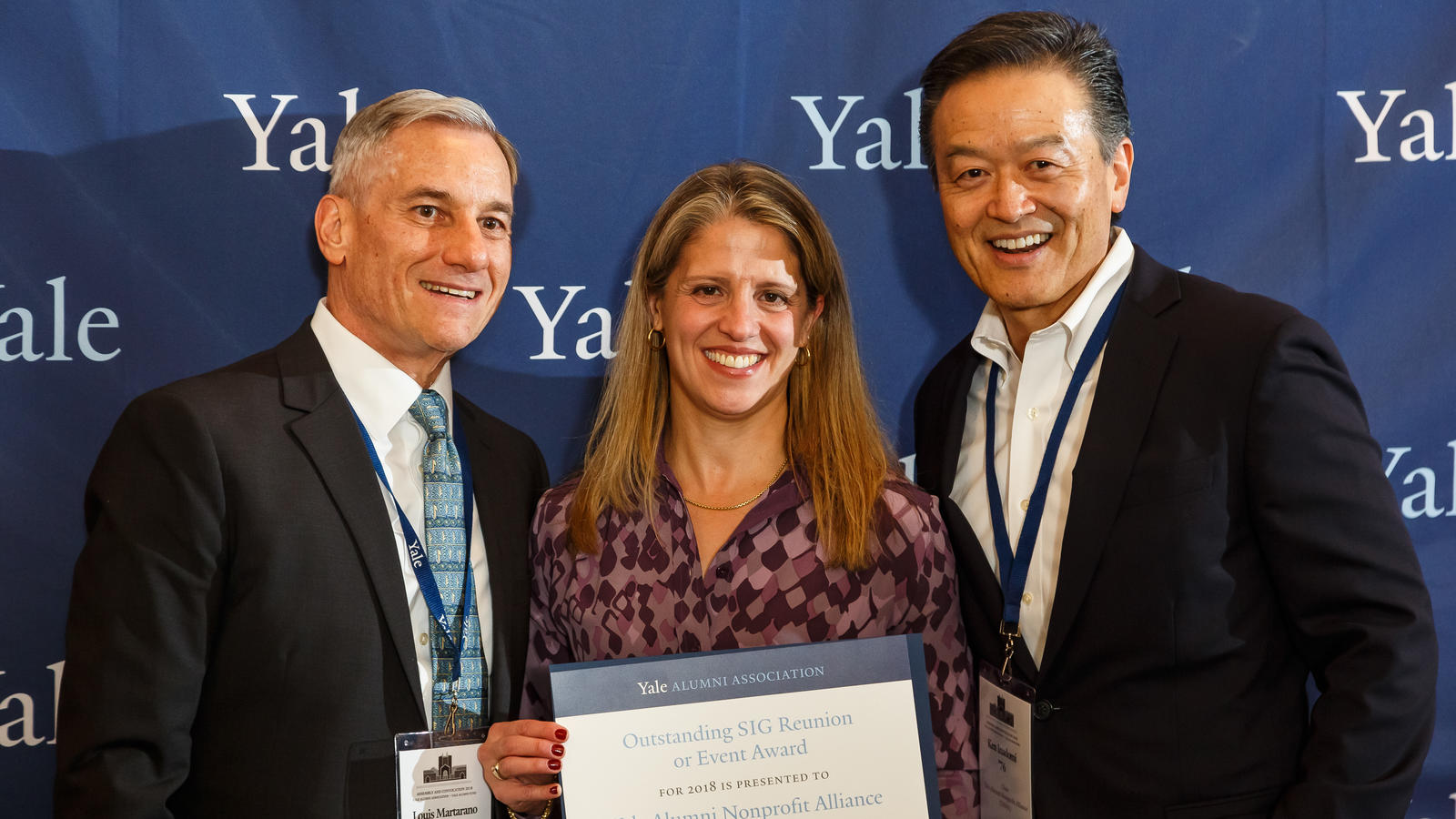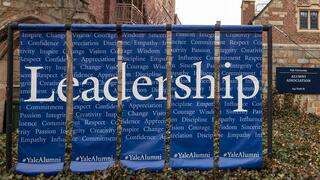In the latest Yale Alumni Association spotlight, Yale Alumni Nonprofit Alliance (YANA) chair Ken Inadomi ’76 spoke to us about how the group got started, its early challenges, his advice for developing interest groups, the importance of diverse leadership teams, and more.
YAA: When did YANA form?
Ken Inadomi: The first YANA meeting convened on January 26, 2011, at the Yale Club of New York City. Pre-event marketing started in late 2010, when the club circulated this announcement to members:
The legion of Yale alums working in the nonprofit world is growing daily. Please join us in the Branford Suite Wednesday, January 26th, for an organizational meeting of nonprofit professionals to explore how we can work together to pool our resources, strategies, and energies to improve our organizations. Practitioners from all areas are welcome, including health care, education, housing, energy/environment, and the arts. Please RSVP to Club member Ken Inadomi ’76.
At this point the name YANA – Yale Alumni Nonprofit Alliance – had not even been formed. Our pre-event buzz generated close to 50 RSVPs, but a blizzard hit the city the night of the meeting, which drastically reduced head count to maybe nine people. Alums in attendance who braved the snow included Kathy Edersheim ’83, Frank Raffaele ’95, and Ted Smith ’00. Their positive support and strategic vision that night foretold a bright future for YANA.
YAA: How did YANA come together? And how were you able to grow from those nine people?
From the beginning we approached YANA as a startup, replacing profit with impact as our bottom line. We recognized that the success factors driving a startup, whether for profit or nonprofit, are essentially the same: You need a vision that addresses a viable market with an unmet need. With those fundamentals in place, you then need to mobilize the resources to pursue your mission.
We were lucky because when we hatched YANA back in 2010, the stars aligned perfectly. We formulated a bold vision: To organize and leverage Yale’s mission-driven community for the greater social good. We had a huge market to serve – a global network of over 160,000 alums, with at least two out of three engaged in social impact, including nonprofit professionals, board members, volunteers, and donors. We identified a significant unmet need: To create a network that enabled mission-driven alums to efficiently convene, connect, and collaborate with one another for advice, encouragement, referrals, jobs, and funding. And alumni engagement has been phenomenal. YANA just passed the 5,000-mark in total followers.
Why was YANA formed? Was it a mutual interest among like-minded alumni or were you looking to fill a void you saw?
YANA’s tagline – Working together, Giving back, Changing lives – echoes the powerful social trend that’s embracing millennials and boomers alike: a movement that minimizes materiality in favor of meaningful experience. And life’s most meaningful experience, arguably, is helping those in need.
The entire Yale community has learned a lot about meaning and happiness through the undergraduate course taught by Professor Laurie Santos that attracted national attention. Professor Santos' research confirmed that the true gateway to happiness isn't more money, materiality, or status. To the contrary, sustained happiness is derived through our relationships and finding meaningful ways to serve others.
Toward this end, imagine if we could create and maintain a pipeline of social impact opportunities for alumni, starting with students as they arrive on campus as freshman and continuing on through retirement – an entire life full of meaningful engagement, tailored to the specific needs, interests, and strengths of the individual. That’s the vision, and we’re determined to get there.
Tell us about your early stages? How did you and your fellow leaders get YANA off the ground?
Our first goal was to build a team. There’s an African proverb, “If you want to go fast go alone, but if you want to go far go together.” And it’s clear that the most effective alumni work is based on teamwork and building a community of like-minded. A prime example is Yale Day of Service. Whenever mission-driven Yale alums get together, great things happen, sparks fly! YANA’s goal is to universalize the Day of Service, to make giving back a part of our daily practice.
How, then, did you draw fellow alumni to join in your efforts?
How did we build our team? With a big promotional lift from the YAA, we hosted the first major YANA event in July 2011 at the Yale Club – a panel titled “Making a Successful Transition from the Private Sector to Nonprofit” – which attracted a standing room crowd of over 300. At the event we announced a meeting the following week for those interested in forming a YANA leadership circle. Over 25 alums attended that follow-up meeting, including many who subsequently emerged as foundational leaders and board members.
What sets YANA apart from similar groups at other campuses?
From what we’ve learned anecdotally, the breadth and depth of YANA’s alumni engagement programming is unique among peer institutions. With our ongoing quest to change lives, we run YANA with the focus of a startup and the urgency of a turnaround. We believe in empowering leaders, particularly young alumni leaders, by encouraging them to use YANA as a platform to pursue their social impact aspirations – whether by launching a new YANA chapter, moderating a panel, or heading a program committee. We'll make mistakes but prefer to ‘fail fast” in pursuing our goals.
We believe that excellent and sustained alumni work requires a strong, diverse leadership team that cuts across racial, gender, and geographical lines. Moreover, we never overlook an opportunity to engage the younger generations. Much of YANA’s best work is being carried out by our youngest members, including Liana Epstein ’14, editor-in-chief of the YANA Global Newsletter; Dasia Moore ’18, YANA’s youngest-ever board member and social justice navigator; Cornelius Saunders ’14, chair of data metrics; and Yang Li ’12, our social media voice via Twitter, Facebook, and LinkedIn. A special hat tip also to Rachel Litman ’91, who stepped up in January to become YANA’s inaugural executive director. Rachel is an attorney and social entrepreneur who brings a wide range of strategic skills to YANA, all of which she’s contributing on a pro bono basis.
If someone was looking to start a new Yale group, or re-energize a dormant group, what is the #1 piece of advice you would give them?
The #1 priority is to clearly define your value proposition. What are you offering that alums can’t get anywhere else? You may have a brilliant game plan, but if it’s not supported by a compelling value proposition, your group isn’t going anywhere.
#2 is to bootstrap growth by taking advantage of the many organizational tools accessible at little to no cost. You can build a global alumni network by using technology that would have been prohibitively expensive only 10 to 15 years ago, including:
- Conference calls, video meetings, and live webinars – Zoom, Skype.
- Mass e-blasts and invitations – Constant Contact, Eventbrite
- Market research tools – Survey Monkey, Google Forms
- Event planning and project management software – Evite, Trello
- And, of course, community building platforms – Facebook, LinkedIn, Instagram, Twitter
All these tools are freely available to help alumni leaders convene, connect, and collaborate with members while advancing their missions.
What has surprised you about your experience with YANA?
A core YANA belief is, “When like-minded, mission-driven people get together great things happen.” And I’m still pleasantly surprised that this plays out at virtually every event we host, from workshops and panels to cocktail receptions and evening teas. Something magical happens when a roomful of people prioritize mission over ego. The flow of conversation is nonstop as new relationships are forged and ideas freely exchanged to advance the greater good.
I enjoy reminding people that YANA also stands for You Are Not Alone.
***
Interested in more information on YANA? You can access the group’s website at yalenonprofitalliance.org or contact Ken directly by email.


